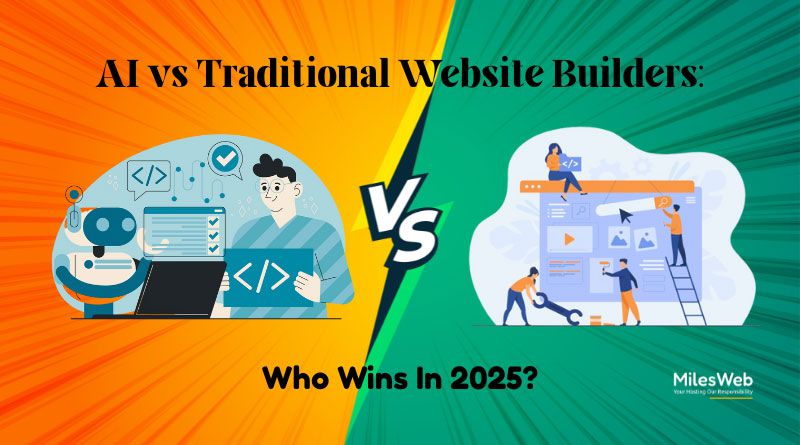In 2025, the digital landscape is undergoing a paradigm shift. There are different tools, like an AI website builder and other web development frameworks, making the web development task easier. You get AI tools with the web hosting plans, and it is still a debatable topic which is better to build websites.
The hosting price for website is nominal if you purchase from a reliable web hosting provider. Building a stunning website and taking it online is a crucial part for any website owner to gain positive business growth. Hence, in this blog, we will discuss the right website building tool among the two.
Understanding AI Website Builders
Tools are leveraging artificial intelligence to automate and simplify the website creation process. Rather than coding from scratch and doing everything yourself through templates, an AI website builder makes the data-driven decisions to produce customized websites.
You can describe it as per your requirement, from layouts to content to technical integrations. Also, you can use AI algorithms for turning ambitions into reality with minimal effort on your end. It is like having an ultra-high-tech website design agency 24/7.
Some best-performing examples include website builders like Dorik AI Website Builder, Framer AI, Divi AI, etc.
Advantages of Using AI Website Builders
There are some convincing reasons why you can use an AI website builder:
- AI website builders offer stunning, quality websites customized to your niche in a fraction of the cost and time. It will take some minutes to get your website ready instead of months.
- You don’t require any technical skill or coding experience because AI will handle all web development tasks.
- Instead of HTML edits, you can make changes in the content or design with simple AI inputs. Everything will work seamlessly behind the scenes.
- AI leverages data and learning algorithms to recommend optimized designs, copy, layouts, images, and more rather than inefficient guesswork.
Exploring Traditional Website Builders
Website builders such as WordPress, Wix, and Squarespace are the most common in the market. It has a number of themes, templates, design options, and huge flexibility in generating websites manually.
Traditional website builders provide you with unrestricted creative flexibility and a series of layout options to choose from. Developers are in full control of layout options and choices, design elements, and aesthetics in general. Thus, it can be done with traditional website builders by adding more UI/UX elements.
These websites do all the setup to get your site without having to do it yourself or pay a web developer (which becomes tedious and expensive). Nevertheless, it has certain benefits as well.
Benefits of Using Traditional Website Builders
You can get these advantages by using a traditional website builder tool.
- A wider range of designer templates and themes for inspiration can ease your customization process.
- More intuitive user interface where you can edit all elements.
- You get the ability to craft every single website component.
- Source code and backend are fully visible and controllable.
- There will be less reliance on black box algorithms that may make unpredictable decisions.
- Tutorials and troubleshooting sites with large communities.
- Those who want to micromanage everything about their web presence will appreciate the extensive control and customizability.
- Plugins and extensions are often available for traditional website builders. Integrated e-commerce features, social media feeds, or other custom elements can be added seamlessly.
Last Remarks: AI vs Traditional Website Builders-Which is Better?
In 2025, AI powered website builders are outpacing conventional builders in speed, personalization, and ease of use. Applied to the development of websites, AI tools allow getting fully-developed websites with SEO-optimized copy and structure hints, including possible visual content aligned with the given brand, within minutes. Small businesses, solopreneurs, and non-tech users have game game-changer in automation. It drastically reduced the coding and designing knowledge need. AI adapts to new trends and designs patterns quickly, ensuring the web’s evolution sustains.
Yet traditional website builders remain king for flexibility and control. For designers and developers who require custom, pixel-perfect design, complex integrations, or a unique user experience, a traditional website builder, like WordPress or Webflow, is often the platform of choice. Traditional website builders often provide more design flexibility, as well as better scalability for larger or more complex projects.
Therefore, AI wins in terms of convenience and speed. However, if creative control, with an eye toward sustainable growth, is a priority, then it is still traditional website builders that have the edge when it comes to choosing a platform. However, the winning platform will depend on your key objectives, your level of skill, and how quickly you are looking to get your project online.

